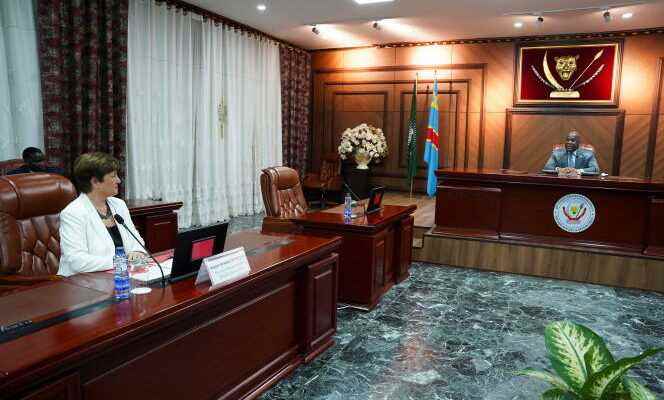To not miss any African news, subscribe to the newsletter of the World Africa from this link. Every Saturday at 6 a.m., find a week of news and debates covered by the editorial staff of the World Africa.
A new economic think-tank devoted to financing developing countries, the Finance for Development Lab, was launched in Paris on Thursday 30 June. Chaired by the economist Daniel Cohen, it wants to emphasize the expertise of the countries of the South, particularly in Africa, and plans to do so by relying on a network of some twenty institutions and specialists in different countries. Its executive director, Martin Kessler, returns in an interview with World Africa on the objectives of this think tank which notably proposes the creation of a new liquidity mechanism for the African continent.
Why do you think it was necessary to create a think-tank dedicated specifically to the financing of developing countries?
We want to help disseminate the research of our partners in the countries of the South to international circles, because today many proposals put forward by these think-tanks are not necessarily heard. We want to be a conduit for these institutions and our ambition is also to help them improve the quality of their work.
The interests of developing countries are not well represented or defended globally. They have been given a lot of promises in the context of the Covid-19 pandemic, whether it was the debt service suspension initiative, which had been presented as a major step forward, or the “common framework” for the restructuring of the debt of poor countries [mis en place par le G20 pour faciliter les négociations en réunissant des pays créanciers comme la Chine et les membres du Club de Paris], or the issue of special drawing rights of the International Monetary Fund [DTS, la réserve de change du FMI, qui a permis d’apporter des liquidités à tous ses pays membres à l’été 2021]. But in the end, these initiatives were rather modeled on what the developed countries wanted and did not lead to much.
Take for example the increase in SDRs. Thanks to this tool, we were able to raise 650 billion dollars [620 milliards d’euros] and, of this amount, about 30 billion went to low-income countries. It is extremely little. There had been talk of reallocating part of the SDRs from the rich countries to the developing economies, but that did not really happen. All this is partly explained by institutional constraints, in particular the European Central Bank (ECB) which considered that part of the SDRs issued could not be lent to other countries because they had to constitute a reserve available at all times. . But there is also a problem of political will and, on the side of the countries of the South, a difficulty in pointing out these contradictions and making alternative proposals.
What do you actually suggest?
We propose the creation of a liquidity and stability fund for Africa. All regions of the world have financial safety nets, such as Asia with the Chiang Mai Initiative [entrée en vigueur en 2010, elle permet aux pays de s’échanger des liquidités s’ils subissent, par exemple, des fuites de capitaux]. But this is not the case for the African continent. As a result, the first actor to which African countries turn in the event of a problem continues to be the IMF. But this is becoming more and more difficult politically, because even if the discourse of the IMF has changed, it continues to impose strict constraints on budgetary discipline. In Ghana, for example, recourse to the IMF is seen as the nuclear option.
We are therefore proposing an intermediate solution with this regional fund which would be set up with the support of donors, which would allow it to benefit from a triple A rating. According to our estimates, it could reach 60 billion dollars thanks to the pooling of funds African countries, concessional loans from developed countries and a reallocation of SDRs. Its vocation would be multiple: to protect commodity-exporting countries in the event of sharp price fluctuations, to intervene during long and complicated debt renegotiations by buying bonds in cash from small creditors to facilitate restructuring, or even to guarantee part of the indebtedness of a country subject to strong fluctuations on the markets and which no longer manages to issue.
Our analysis is that at equal fundamentals, there is a real difference in price between African bonds and those of other countries. This stems from the fact that African assets are perceived as risky, but it is also due to a lack of liquidity.
On the issue of restructuring and debt, one of the areas of tension is also the role of China. How do you integrate it into your thoughts?
It is true that the “common debt restructuring framework” has not worked largely because of China. The Chinese have already carried out major restructuring in the past, but always unilaterally and uncoordinated with the Paris Club. That’s what happened with Zambia or Ethiopia [deux pays qui ont demandé à bénéficier du cadre commun] : they seem to have been afraid to create a precedent. Indeed, these two countries are not major exposures for China in absolute terms, but any concession could give similar envy to other larger debtors, as well as private creditors.
Our approach on this subject is to set up an initiative with Chinese think-tanks in order to better understand the blockages. By already organizing several seminars on these issues, we have seen that there is a real appetite for dialogue, a desire to talk about these subjects, even if they are controversial. China realizes that there is a problem, that it will not recover all its debts and that a doctrine on restructuring must be determined.
